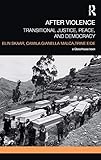After violence : transitional justice, peace and democracy / Elin Skaar, Camila Gianell Malca and Trine Eide.
Material type: TextSeries: Transitional justice: Publisher: Abingdon, Oxon [England] ; New York : Routledge, 2015Description: xiv, 217 pages ; 24 cmContent type: text Media type: unmediated Carrier type: volumeISBN: 9781138020085; 1138020087; 1315778580; 9781138241725; 1138241725Other title: Transitional justice, peace and democracySubject(s): Transitional justice -- Case studies | Human rights -- Case studies | Peace-building -- Case studies | Democracy -- Case studies | Truth commissions -- Case studies | Uruguay -- Politics and government -- 20th century | Peru -- Politics and government -- 20th century | Rwanda -- Politics and government -- 20th century | Angola -- Politics and government -- 20th century | Democracy | Human rights | Peace-building | Politics and government | Transitional justice | Truth commissions | Angola | Peru | Rwanda | Uruguay | Transitional Justice | Friedenskonsolidierung | Demokratie | Rechtsvergleich | 1900 - 1999Genre/Form: Case studies.DDC classification: 323 LOC classification: JC571 | .S6296 2015
TextSeries: Transitional justice: Publisher: Abingdon, Oxon [England] ; New York : Routledge, 2015Description: xiv, 217 pages ; 24 cmContent type: text Media type: unmediated Carrier type: volumeISBN: 9781138020085; 1138020087; 1315778580; 9781138241725; 1138241725Other title: Transitional justice, peace and democracySubject(s): Transitional justice -- Case studies | Human rights -- Case studies | Peace-building -- Case studies | Democracy -- Case studies | Truth commissions -- Case studies | Uruguay -- Politics and government -- 20th century | Peru -- Politics and government -- 20th century | Rwanda -- Politics and government -- 20th century | Angola -- Politics and government -- 20th century | Democracy | Human rights | Peace-building | Politics and government | Transitional justice | Truth commissions | Angola | Peru | Rwanda | Uruguay | Transitional Justice | Friedenskonsolidierung | Demokratie | Rechtsvergleich | 1900 - 1999Genre/Form: Case studies.DDC classification: 323 LOC classification: JC571 | .S6296 2015| Item type | Current library | Call number | Copy number | Status | Notes | Date due | Barcode |
|---|---|---|---|---|---|---|---|
 Books
Books
|
Female Library | JC571 .S6296 2015 (Browse shelf (Opens below)) | 1 | Available | STACKS | 51952000344179 | |
 Books
Books
|
Main Library | JC571 .S6296 2015 (Browse shelf (Opens below)) | 1 | Available | STACKS | 51952000344186 |
"GlassHouse book."
Includes bibliographical references and index.
"After Violence: Transitional Justice, Peace, and Democracy examines the effects of transitional justice on the development of peace and democracy. Anticipated contributions of transitional justice mechanisms are commonly stated in universal terms, with little regard for historically specific contexts. Yet a truth commission, for example, will not have the same function in a society torn by long-term civil war or genocide as in a society emerging from authoritarian repression. Addressing trials, reparations, truth commissions, and amnesties, the book systematically addresses the experiences of four very different contemporary transitional justice cases: post authoritarian Uruguay and Peru and post-conflict Rwanda and Angola."--Page [i].
1. Transitional justice alternatives: claims and counterclaims. -- 2. Towards a framework for impact assessment. -- 3. Uruguay : reconstructing peace and democracy through transitional justice. -- 4. Peru : changing contexts for transitional justice. -- 5. Rwanda : some peace, no democracy, and the complex role of transitional justice. -- 6. Angola : negative peace and autocracy in the shadow of impunity. 7. Conclusions. -- Appendix 1: Truth commissions around the world, 1982-2014. -- Appendix 2 : Statistical measures used in the analysis.
1 2

There are no comments on this title.